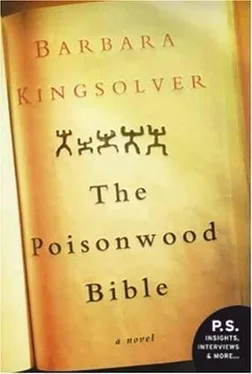Barbara Kingsolver - The Poisonwood Bible
Здесь есть возможность читать онлайн «Barbara Kingsolver - The Poisonwood Bible» весь текст электронной книги совершенно бесплатно (целиком полную версию без сокращений). В некоторых случаях можно слушать аудио, скачать через торрент в формате fb2 и присутствует краткое содержание. Жанр: Современная проза, на английском языке. Описание произведения, (предисловие) а так же отзывы посетителей доступны на портале библиотеки ЛибКат.
- Название:The Poisonwood Bible
- Автор:
- Жанр:
- Год:неизвестен
- ISBN:нет данных
- Рейтинг книги:4 / 5. Голосов: 1
-
Избранное:Добавить в избранное
- Отзывы:
-
Ваша оценка:
The Poisonwood Bible: краткое содержание, описание и аннотация
Предлагаем к чтению аннотацию, описание, краткое содержание или предисловие (зависит от того, что написал сам автор книги «The Poisonwood Bible»). Если вы не нашли необходимую информацию о книге — напишите в комментариях, мы постараемся отыскать её.
Oprah Book Club® Selection, June 2000: As any reader of The Mosquito Coast knows, men who drag their families to far-off climes in pursuit of an Idea seldom come to any good, while those familiar with At Play in the Fields of the Lord or Kalimantaan understand that the minute a missionary sets foot on the fictional stage, all hell is about to break loose. So when Barbara Kingsolver sends missionary Nathan Price along with his wife and four daughters off to Africa in The Poisonwood Bible, you can be sure that salvation is the one thing they're not likely to find. The year is 1959 and the place is the Belgian Congo. Nathan, a Baptist preacher, has come to spread the Word in a remote village reachable only by airplane. To say that he and his family are woefully unprepared would be an understatement: "We came from Bethlehem, Georgia, bearing Betty Crocker cake mixes into the jungle," says Leah, one of Nathan's daughters. But of course it isn't long before they discover that the tremendous humidity has rendered the mixes unusable, their clothes are unsuitable, and they've arrived in the middle of political upheaval as the Congolese seek to wrest independence from Belgium. In addition to poisonous snakes, dangerous animals, and the hostility of the villagers to Nathan's fiery take-no-prisoners brand of Christianity, there are also rebels in the jungle and the threat of war in the air. Could things get any worse?
In fact they can and they do. The first part of The Poisonwood Bible revolves around Nathan's intransigent, bullying personality and his effect on both his family and the village they have come to. As political instability grows in the Congo, so does the local witch doctor's animus toward the Prices, and both seem to converge with tragic consequences about halfway through the novel. From that point on, the family is dispersed and the novel follows each member's fortune across a span of more than 30 years.
The Poisonwood Bible is arguably Barbara Kingsolver's most ambitious work, and it reveals both her great strengths and her weaknesses. As Nathan Price's wife and daughters tell their stories in alternating chapters, Kingsolver does a good job of differentiating the voices. But at times they can grate-teenage Rachel's tendency towards precious malapropisms is particularly annoying (students practice their "French congregations"; Nathan's refusal to take his family home is a "tapestry of justice"). More problematic is Kingsolver's tendency to wear her politics on her sleeve; this is particularly evident in the second half of the novel, in which she uses her characters as mouthpieces to explicate the complicated and tragic history of the Belgian Congo.
Despite these weaknesses, Kingsolver's fully realized, three-dimensional characters make The Poisonwood Bible compelling, especially in the first half, when Nathan Price is still at the center of the action. And in her treatment of Africa and the Africans she is at her best, exhibiting the acute perception, moral engagement, and lyrical prose that have made her previous novels so successful. -Alix Wilber
From Publishers Weekly
In this risky but resoundingly successful novel, Kingsolver leaves the Southwest, the setting of most of her work (The Bean Trees; Animal Dreams) and follows an evangelical Baptist minister's family to the Congo in the late 1950s, entwining their fate with that of the country during three turbulent decades. Nathan Price's determination to convert the natives of the Congo to Christianity is, we gradually discover, both foolhardy and dangerous, unsanctioned by the church administration and doomed from the start by Nathan's self-righteousness. Fanatic and sanctimonious, Nathan is a domestic monster, too, a physically and emotionally abusive, misogynistic husband and father. He refuses to understand how his obsession with river baptism affronts the traditions of the villagers of Kalinga, and his stubborn concept of religious rectitude brings misery and destruction to all. Cleverly, Kingsolver never brings us inside Nathan's head but instead unfolds the tragic story of the Price family through the alternating points of view of Orleanna Price and her four daughters. Cast with her young children into primitive conditions but trained to be obedient to her husband, Orleanna is powerless to mitigate their situation. Meanwhile, each of the four Price daughters reveals herself through first-person narration, and their rich and clearly differentiated self-portraits are small triumphs. Rachel, the eldest, is a self-absorbed teenager who will never outgrow her selfish view of the world or her tendency to commit hilarious malapropisms. Twins Leah and Adah are gifted intellectually but are physically and emotionally separated by Adah's birth injury, which has rendered her hemiplagic. Leah adores her father; Adah, who does not speak, is a shrewd observer of his monumental ego. The musings of five- year-old Ruth May reflect a child's humorous misunderstanding of the exotic world to which she has been transported. By revealing the story through the female victims of Reverend Price's hubris, Kingsolver also charts their maturation as they confront or evade moral and existential issues and, at great cost, accrue wisdom in the crucible of an alien land. It is through their eyes that we come to experience the life of the villagers in an isolated community and the particular ways in which American and African cultures collide. As the girls become acquainted with the villagers, especially the young teacher Anatole, they begin to understand the political situation in the Congo: the brutality of Belgian rule, the nascent nationalism briefly fulfilled in the election of the short-lived Patrice Lumumba government, and the secret involvement of the Eisenhower administration in Lumumba's assassination and the installation of the villainous dictator Mobutu. In the end, Kingsolver delivers a compelling family saga, a sobering picture of the horrors of fanatic fundamentalism and an insightful view of an exploited country crushed by the heel of colonialism and then ruthlessly manipulated by a bastion of democracy. The book is also a marvelous mix of trenchant character portrayal, unflagging narrative thrust and authoritative background detail. The disastrous outcome of the forceful imposition of Christian theology on indigenous natural faith gives the novel its pervasive irony; but humor is pervasive, too, artfully integrated into the children's misapprehensions of their world; and suspense rises inexorably as the Price family's peril and that of the newly independent country of Zaire intersect. Kingsolver moves into new moral terrain in this powerful, convincing and emotionally resonant novel.













